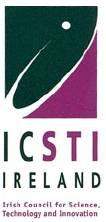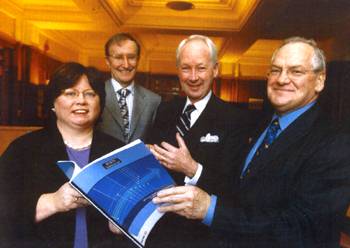| 2003 |

|
YEAR BOOK |
Forf�s - Irish Council for Science, Technology and Innovation
|
The Irish Council for Science, Technology and Innovation (ICSTI)
|

|

|
The Irish Council for Science, Technology & Innovation (ICSTI) was created in April 1997. Its role is to advise the Government and the Board of Forf�s on science, technology and innovation (STI) policy.
The Council has twenty-five members and is chaired by Dr Edward M. Walsh, President Emeritus, University of Limerick.
The Council's work programme is implemented through the establishment of Task Forces which bring forward draft recommendations on priority topics for ratification by the Council.

-
Framework for an Overarching National Policy for Research and Technological Development
(Chair: Dr Edward M. Walsh, Chairman of ICSTI)
In March 2002, the Government requested the Council to bring forward proposals to develop an appropriate Framework for an Overarching National Policy for Research and Techno-logical Development . It also requested the Council to convene a high level Commission (chaired by the Chairman of ICSTI) to assist it in bringing forward these proposals. The high level commission of national and international experts reported to the Council in November. In December, the Council Report was presented by Dr. Walsh to the T�naiste and Minister for Enterprise, Trade and Employment, Ms. Mary Harney, T.D.
-
The Utilisation of Intellectual Property for Competitive Advantage
(Original Task Force Chair: Dr Alva DeVoy, KBC Asset Management Ltd and, later, Dr Ena Prosser, BioResearch Ireland)
In its statement on Commercialisation of Publicly Funded Research , published in 2001, the Council highlighted the importance of commercialization as one mission of the research sector. It identified the need for greater resources for industrial liaison and for early stage funding of research with commercial potential.
Following on from that work, the Council examined the issue of the legal framework for commercialisation, examining good practice abroad and in Ireland. This led to the recommendation, in the Council Statement Utilising Intellectual Property for Competitive Advantage (April 2003), that Ireland should have an agreed National Code of Practice for the management of intellectual property from publicly funded research carried out in universities, public research institutions and institutes of technology. The Council has initiated follow-up activities, currently in progress, to facilitate the development and implementation of that Code.
-
The Identification of Initiatives to Strengthen the Implementation of Strategic Design Practices in Industry in Ireland
(Task Force Chair: Mr Paul Holden, R�dacteurs Ltd.)
In September 2002, the Council published its Statement on this topic. The work benchmarked product design and development practices in indigenous, non-food manufacturing firms and, in addition, identified appropriate mechanisms to encourage firms to improve their strategic use of design.
-
Further Embedding the PharmaChem Industry in Ireland
(Task Force Chair: Professor Anita Maguire, National University of Ireland, Cork)
The Council published a Statement entitled Embedding the PharmaChem Industry in Ireland . The Statement focusses on the opportunities for the PharmaChem industry to strengthen its base here. This is part of a continuing process to follow up on the Technology Foresight recommendations made to Government (April 1999). The Council has recommended complementary actions on taxation, skills and infrastructure.
-
The Role of Science and Technology in Sustainable Development in Ireland
(Task Force Chair: Professor Ted Farrell, National University of Ireland, Dublin)
This work, which is nearing completion, considers the implications for Irish public policy of sustainable development as a national and international goal. In particular, it examines the part science and technology play in the movement towards sustainable development strategies. It will offer recommendations for strengthening the links between scientific research, technological innovation and sustainable development.
-
An Examination of the Key Opportunities and Threats for Ireland of Nanotechnologies
(Task Force Chair: Professor Donald Fitzmaurice, National University of Ireland, Dublin)
Nanotechnology is a key enabling technology which, together with information and communications technologies (ICT) and biotechnology will enhance innovations and impact significantly on society. There are a number of national strategies and initiatives in the area of nanotechnologies. This work, which is nearing completion, has reviewed the threats and opportunities for Ireland and formulated proposed policy responses so as to ensure that it exploits the opportunities presented by its relative strength in nanotechnology. It will be published in the form of a Statement.
-
European Research Area (ERA)
(Task Force Chair: Dr Peter Heffernan, Marine Institute)
In the context of the importance accorded to the ERA agenda at both European and national level, ICSTI is developing a view on the national approach to the development of the ERA. The Council is identifying priorities and is to advance relevant actions and recommendations.
-
Pre-Budget Submission on Research
(Task Force Chair: Dr Mike Hopkins, Scientific Systems Ltd.)
The Council has issued a pre-Budget Statement in relation to national expenditure on research and development in 2004. The National Development Plan (NDP) committed a significant increase in funding to research over the period to 2006. Good progress has been made across a number of key areas including the Programme for Research in Third Level Institutions (PRTLI) and SFI (Science Foundation Ireland). Stability and continuity of funding are essential to the achievement of the overall objectives and desired outcomes of the NDP. Six specific expenditure priorities for 2004 were identified.
-
Review of Progress on the Implementation of Recommendations Contained in the 1999 Technology Foresight Report
(Task Force Chair: Mr Paul Holden, R�dacteurs Ltd.)
ICSTI completed a major Technology Foresight exercise in 1999, which was a significant input for the formulation of the National Development Plan and which led to the establishment of the �711 million Technology Foresight Fund and of Science Foundation Ireland (SFI). The Council is beginning a high level review of progress to date on the implementation of recommendations contained in the Report.
-
Earning Profiles for Science and Engineering Graduates
(Task Force Chair: Professor William Reville, Biochemistry Department, NUI Cork)
The Council considered that, in the context of the findings of the recent Department of Education's Task Force on the Physical Sciences , salary plays a significant role both in attracting students into the Science and Engineering professions. In its Statement, the Council examined the perception that starting salaries for science and engineering (S&E) graduates are competitive with those of other professions. It found that average starting salaries for S&E graduates are competitive with those graduating in other disciplines. Further work will continue in this area.
Contact: The ICSTI Secretariat is provided by Forf�s, the national policy and advisory board for enterprise, trade, science, technology and innovation. Correspondence should be addressed to:
Ms Josephine Lynch, Secretary of ICSTI,
Wilton Park House, Wilton Place, Dublin 2;
Tel: +353 1 607 3186; E-mail: [email protected] ;
ICSTI Statements are available either on the following website: www.forfas.ie/icsti or by contacting the secretariat.